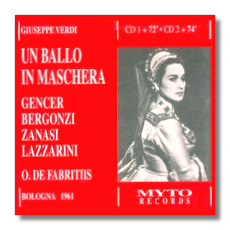
The Internet's Premier Classical Music Source
Related Links
- Verdi Reviews
- Latest Reviews
- More Reviews
-
By Composer
-
Collections
DVD & Blu-ray
Books
Concert Reviews
Articles/Interviews
Software
Audio
Search Amazon
Recommended Links
Site News
 CD Review
CD Review
Giuseppe Verdi

Un ballo in maschera
- Leyla Gencer (Amelia)
- Carlo Bergonzi (Riccardo)
- Mario Zanasi (Renato)
- Adriana Lazzarini (Ulrica)
- Dora Gatta (Oscar)
Orchestra & Chorus of the Teatro Comunale di Bologna/Oliviero de Fabritiis
Myto MCD 011.238 ADD monaural 2CDs: 72:45, 74:29
This Ballo was recorded on the night of November 28, 1961 in Bologna's Teatro Comunale. Because her photograph is on the cover of the booklet, I assume Turkish diva Leyla Gencer is intended to be this set's main selling-point. Gencer, as many know, was active during an era where there was no shortage of dramatic sopranos – notably Callas and Tebaldi. Today, the recording companies would be dueling to sign her on. In the 1950s and 1960s, the record companies allowed her to slip by. Nothing I've heard from her quite puts her in the Maria Callas or Renata Tebaldi category, but there's no escaping the fact that she was a dramatic singer with a powerful voice well-suited not only to Bellini, Donizetti, and Verdi, but to more unusual repertoire as well. Her Amelia is satisfyingly sung, particularly "Morrò, ma prima in grazia" which is soaked with tears yet vocally intact. Above the staff, her voice tends to thicken, and I miss the precision that Callas (with all her vocal shortcomings), Tebaldi, and Leontyne Price brought to this role. Still, this is singing that attracts attention.
Bergonzi made two commercial recordings of his Riccardo – with Solti for London/Decca, and with Leinsdorf for RCA. In this live performance, he plays to the audience a little with lachrymose stylings, but essentially this is the same classy Riccardo that we know and love. Zanasi receives the most vociferous acclaim of the evening – and most deserved it is – with his bitter performance of "Eri tu." I don't know much about Zanasi, but his Renato is as good as any I've heard. This production of Ballo was set in Boston, and Zanasi, a "Creole" secretary to Riccardo, seems to be taking his cue from jealous Otello. (What is the likelihood that a Governor of Boston would have had a Creole secretary?) This vivid interpretation, while neither crude nor self-indulgent, is full of thrills on CD. What was he like on stage? The Ulrica and Oscar, on the other hand, are nothing to get excited about, although they certainly are competent.
With slower tempos than usual, conductor Oliviero de Fabritiis is most sensitive and refined. He can't always keep everyone together (as in the opening chorus), but there's nothing routine about his thoughtful interpretation. He and Zanasi are the best reasons to acquire this set, in my opinion.
This is a live recording, and the prompter, audience, and stage movement all make their presence known. However, despite a balance that favors the orchestral winds, the sound is not bad at all. It sounds like a professional job. Don't expect recording studio standards, though. There is a problem with the second disc. For the first half, tracks are separated by two-second pauses. This plays havoc with continuity, particularly when the pauses catch a singer in mid-phrase. Perhaps Myto will correct this obvious fault in time. The booklet contains a track listing and a brief essay about the opera and the neglected Gencer.
Myto has added a bonus: Gencer and tenor Giorgio Merighi singing the Act Two love music in à La Scala performance from April 8, 1973. If anything, Gencer seems more vocally secure here; Merighi makes little impression. This excerpt is distantly recorded, however – apparently from a seat in the auditorium. This bonus adds little to an already excellent Bolognese Ballo.
Copyright © 2001, Raymond Tuttle


















